Microsoft's Surface 3 tablet runs full version of Windows
- Published
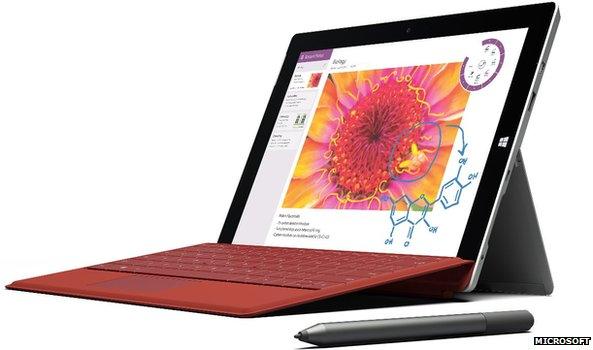
The Surface 3 benefits from a clip-on keyboard and pen, but they must be bought as add-ons
Microsoft has refreshed its tablet line-up with a new entry-level device that runs more software, but is also more expensive than its predecessor.
The Surface 3 is powered by an Intel processor, unlike the ARM-based chip in the Surface 2.
That means it uses the Windows 8 operating system, rather than the more limited Windows RT.
Experts suggest the move could help Microsoft replicate the success of its higher-specification Surface Pro 3.
The bigger tablet, which was launched 10 months ago, features a 12in (30.5cm) screen, compared with the 10.8in display of the new Surface 3.
Shipments of Surface tablets rose from 1.8 million units in the last three months of 2013 to 2.1 million units for the same period in 2014, according to research group Canalys, with the Pro 3 accounting for the bulk of demand since it went on sale.
Microsoft's share of the tablet market has grown from 2.3% to 3.2% as a result, while Apple has seen sales of its iPad decline, although it remains the bestselling brand.
Microsoft markets the Pro 3 as "the tablet that can replace your laptop", and is using similar language for the new model.
But it will target the Surface 3 at those on tighter budgets such as students and schools, and mobile workers who may want a lighter, smaller design.
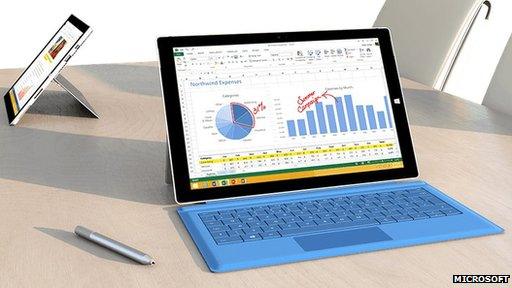
Last year's launch of the larger Surface Pro 3 helped boost sales of Microsoft's tablets
"For people that need to get stuff done, generally you need a keyboard and some people need a pen, and that's where our device plays," said Dale Perrigo, a Surface marketing manager.
"If you want a pure entertainment that's not what this device is."
The release date is 7 May.
Price shift
The basic version of the Surface 3 - featuring 64 gigabytes of storage, 2GB of RAM and an Intel Atom x7 processor - costs £419.
That is about a third lower than the £639 price tag of the cheapest Surface Pro 3, but about two-thirds more than the £259 that had been charged for the basic Surface 2, which had less storage.
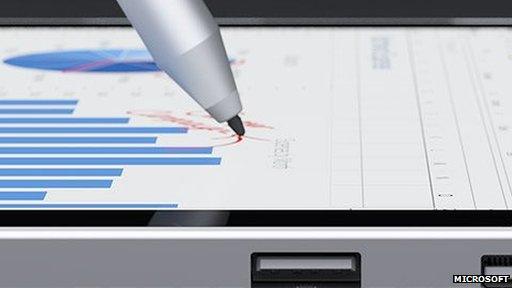
Microsoft says that its touchscreen pen lets its Surface tablets be used instead of paper
The touchscreen pen and keyboard cover are not included, and add £155 to the cost.
"Because it's an Atom processor it is under-powered compared to the Pro 3, which has plenty of horsepower," commented Tim Coulling, an analyst at Canalys.
"So, it's not going to suit everyone as a notebook replacement and will be for people who only want it for lighter productivity tasks.
"But there are a lot of those people out there."
Fanless but thick
Using Windows 8 rather than Windows RT - with the offer of a free upgrade to Windows 10 when it becomes available - means the entry-level Surface gains access to more programs.
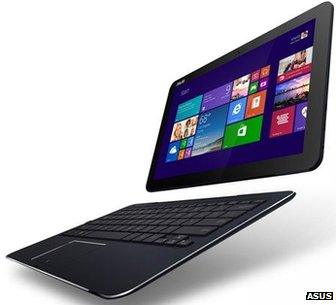
Asus's new Windows tablet is thinner but has micro USB ports rather than the more commonly used USB 3.0
The Surface 2, for example, had been unable to run the full version of Photoshop, CorelDraw, Spotify, World of Warcraft or Google Chrome.
The new model's Atom-class chip does, however, mean the Surface 3 will struggle with some processor-intensive programs - such as video editors, computer-aided design (CAD) software and graphics-intensive games - which the Pro 3 model will be more suited for.
The new tablet is fanless, but significantly thicker - at 8.7mm (0.34in) - than many of its rivals in order to incorporate a standard USB 3.0 socket.
That makes it 30% thicker than both Dell's Android-based Venue 8 7840 and Apple's iPad Air 2, and 13% deeper than the tablet part of Asus's Windows-powered Transformer Book T300 Chi.
"We optimised for a port that enables connections to the largest number of devices and peripherals possible," explained a Microsoft spokeswoman.
Apple and Google recently released computers with a smaller type of cable port that can transfer data at double the speed, called USB-C.
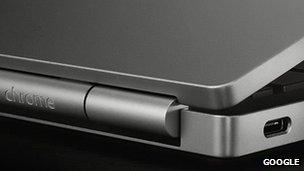
Google's Chromebook Pixel is one of the first computers to feature the new USB-C port
Mr Coulling said the technology could lead to slimmer Surfaces, but added that it might have been too early to adopt the technology.
"The Surface 3 would have been thinner had Microsoft included it, but then users would have had to worry about adding converters or upgrading their peripherals," he said.
"But I think it will be there in the next revision of the product."
Schools and offices
Another expert suggested the new tablets should further boost Microsoft's tablet sales, but warned they could put some of the firm's business relationships under strain.
"Right now there is a huge battle going on in the education space to ensure the next generations of users stay familiar with and loyal to Microsoft rather than solutions from Google and others," said Martin Garner from the CCS Insight consultancy.
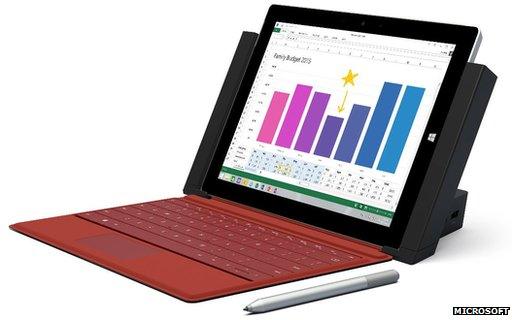
The Surface 3 can be connected to a docking station to gain additional ports
"Microsoft is also clearly going after business users - with Office 365 bundled in, it's the sort of device companies will give to workers who are regularly on the move.
"So, the new Surface 3 is a welcome move, but it will put Microsoft into increasing competition with its partners who make Windows-powered products, such as Dell and Lenovo."
- Published20 May 2014
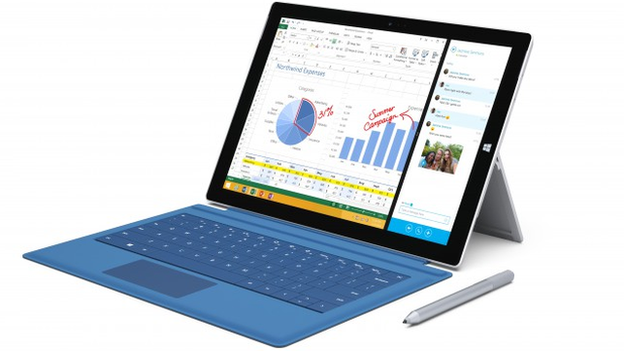
- Published9 March 2015
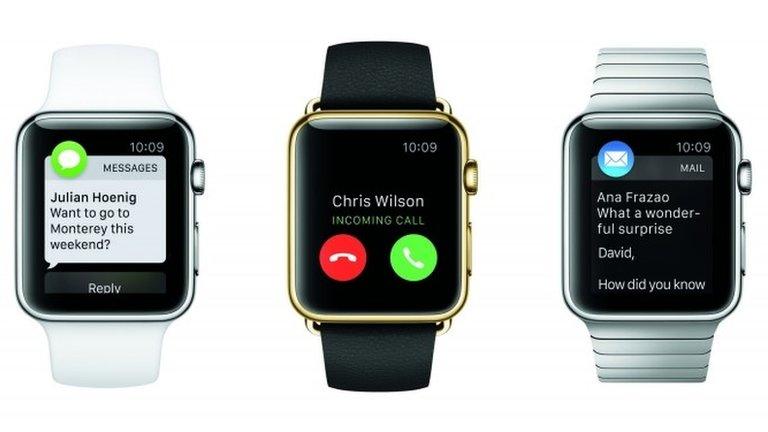
- Published27 February 2015
